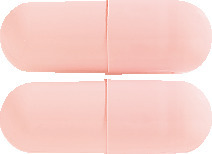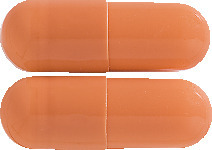What is in this leaflet
This leaflet answers some common questions about Galantamine AN SR modified release capsules. It does not contain all the available information. It does not take the place of talking to your doctor or pharmacist.
All medicines have risks and benefits. Your doctor has weighed the risks of you taking Galantamine AN SR against the benefits this medicine is expected to have for you.
If you have any concerns about taking Galantamine AN SR, ask your doctor or pharmacist.
Keep this leaflet with your medicine. You may need to read it again.
What Galantamine AN SR is used for
Galantamine AN SR is used to treat mild to moderately severe dementia of the Alzheimer's type.
The symptoms of Alzheimer’s disease include confusion, memory loss or other changes in behaviour. As the disease progresses, patients find it more and more difficult to carry out their normal daily activities.
The symptoms of Alzheimer’s disease are thought to be due to a lack of acetylcholine, a substance which transmits messages between brain cells. Galantamine AN SR increases the amount of this substance to help improve or stabilise the symptoms and therefore slow the progress of Alzheimer’s disease.
Your doctor may have prescribed Galantamine AN SR for another reason. Ask your doctor if you have any questions about why this medicine has been prescribed for you.
Before you take Galantamine AN SR
When you must not take it
Do not take Galantamine AN SR if you have:
- an allergy to Galantamine AN SR or any of the ingredients. See Product Description at the end of this leaflet for a list of ingredients.
- severe liver and/or kidney disease.
Do not take Galantamine AN SR if the packaging is torn or shows signs of tampering. Do not use Galantamine AN SR beyond the expiry date (month and year) printed on the pack.
Before you start to take it
You must tell your doctor if you are:
- pregnant, or planning to become pregnant
- breastfeeding, or planning to breastfeed
- planning to undergo surgery which will require anaesthesia.
You must also tell your doctor if you have, or have had any of the following health problems:
- liver and/or kidney disease
- heart problems
- stomach ulcers
- brain disorders, such as Parkinson’s disease, fits
- breathing disorders, such as asthma, pneumonia
- recent gut or bladder surgery
- difficulties in passing urine
- attacks of sudden abdominal pain
If you have not told your doctor or pharmacist about any of the above, tell them before you start taking or are given Galantamine AN SR.
Your doctor will advise you whether or not to take Galantamine AN SR or if you need to adjust the dose or alter your treatment. Since there may be other related conditions that Galantamine AN SR is not intended to treat, you should verify with your doctor that you are taking Galantamine AN SR for the treatment of mild to moderate Alzheimer’s disease.
Initial results from clinical trials in patients with mild cognitive impairment of various causes have shown a slightly higher mortality rate (higher death rate) in those taking Galantamine AN SR than those taking placebo (a pill without an active ingredient which is commonly used in clinical trials as a reference for comparison). The reason for this difference is currently not known and may just be due to chance. There is no evidence of increased risk of death in those with mild to moderately severe Alzheimer's disease taking Galantamine AN SR.
Taking other medicines
Tell your doctor or pharmacist if you are taking any other medicines, including medicines you can buy without a prescription from a pharmacy, supermarket or health food shop.
In particular, tell your doctor or pharmacist if you are taking any of the following:
- anticholinergic medicines (used to prevent travel sickness, relieve stomach cramps, spasms or diarrhoea)
- cholinergic medicines (e.g. bethanecol and certain medicines used during surgery)
- medicines used to treat Parkinson’s disease
- medicines for certain heart problems (such as digoxin, quinidine) or to help lower blood pressure (such as a class of medicine called beta blockers)
- medicines used for breathing problems
- certain medicines used to treat fungal infections (such as ketoconazole) or bacterial infections (such as erythromycin)
- certain medicines used to relieve pain, swelling and other symptoms of inflammation, including arthritis
- certain medicines used to treat depression (such as paroxetine, fluoxetine, fluvoxamine).
These medicines may be affected by Galantamine AN SR or may affect how well Galantamine AN SR works. Your doctor or pharmacist can tell you what to do if you are taking any of these medicines.
Effects on driving and operating machinery
- Alzheimer’s disease may reduce your ability to drive or operate machines.
- Galantamine AN SR may cause dizziness or drowsiness in some people, especially during initial treatment.
- Discuss with your doctor whether it is safe for you to drive or operate machinery.
Taking Galantamine AN SR
Galantamine AN SR modified release capsules should be taken once a day, preferably with food. Be sure to drink plenty of liquids during your treatment with Galantamine AN SR to keep yourself hydrated. The capsule must be swallowed whole. The contents should not be crushed and sprinkled on food.
Adults
The dose of Galantamine AN SR is gradually increased to the most suitable dose. The necessary dosage steps should be determined by your doctor to suit your needs.
The following scheme is an example of how your doctor may increase the dose:
- Start with 8 mg a day.
- After four weeks of treatment, raise the dose to 16 mg a day.
- After at least another four weeks of treatment, raise the dose to 24 mg a day.
For long-term treatment, up to 24 mg a day is usually suitable but your doctor will determine the dose that is best for you.
If treatment is discontinued for more than several days, tell your doctor. Your doctor will need to restart your treatment at the lowest dose. This will minimise the chance of experiencing side effects.
Children
Galantamine AN SR is not recommended for children.
If you do not understand the instructions provided with this medicine, ask your doctor or pharmacist for help.
If you forget to take it
- If it is almost time for your next dose, skip the dose you missed and take your next dose when you are meant to.
- Otherwise, take it as soon as you remember, and then go back to taking it as you would normally.
- Do not take a double dose to make up for the dose you missed.
If you have missed more than one dose, or are not sure what to do, check with your doctor or pharmacist.
If you have trouble remembering when to take your medicine, ask your pharmacist for some hints.
If you have taken too much (overdose)
Immediately telephone your doctor or the Poisons Information Centre for advice, or go to Accident and Emergency at your nearest hospital. Do this even if there are no signs of discomfort or poisoning. You may need urgent medical attention.
Poisons Information Centre telephone numbers:
- Australia: 13 11 26
- New Zealand: 0800 764 766 or 0800 POISON
Keep these telephone numbers handy.
If you take too much Galantamine AN SR, you may experience vomiting or a feeling that you want to vomit, nausea, stomach cramps, excessive production of saliva, tears or sweat, dry mouth, loss of control of your bladder or bowels, a slow or fast heart beat, low blood pressure, dizziness, light-headedness, muscle weakness or twitching, fits, breathing difficulties, chest pain, hallucinations or you may collapse.
While you are taking Galantamine AN SR
Things you must do
- Always follow your doctor’s instructions carefully.
- Tell your doctor if you become pregnant while taking Galantamine AN SR.
- If you are about to start taking a new medicine, tell your doctor and pharmacist that you are taking Galantamine AN SR.
Things you must not do
- Do not use Galantamine AN SR to treat any other complaint unless your doctor says so.
- Do not give this medicine to anyone else, even if their symptoms seem similar to yours.
Side Effects
All medicines can have side effects. Sometimes they are serious, most of the time they are not. You may need medical treatment if you get some side effects. Do not be alarmed by this list of possible side effects. You may not experience any of them. Ask your doctor or pharmacist to answer any questions you may have.
Tell your doctor if you experience any of the following and they worry you:
- nausea, vomiting, diarrhoea, stomach pain or discomfort, indigestion, difficulty swallowing
- low potassium levels in the blood - weakness, muscle cramps, numbness and tingling that begins in the lower extremities
- leg cramps, tingling in the hands or feet
- ringing in the ears
- dehydration (sometimes severe) - thirst , lack of fluids
- hallucinations (seeing, feeling or hearing things that are not there)
- mood changes such as agitation or aggressive feelings
- feeling depressed or having thoughts of harming yourself
- low blood pressure - dizziness, light-headedness
- slow, fast or irregular heart beat
- increased sweating
- fever
- skin rashes
- trembling or shakiness
- loss of appetite, weight loss
- drowsiness, tiredness, weakness, feeling unwell, confusion, trouble sleeping, headache
- falling (sometimes resulting in injury)
- runny or blocked nose
- urinary tract infection
- high blood pressure
- elevated liver enzymes
- yellowing of the skin and eyes
- light coloured bowel motions
- dark coloured urine.
Some of these side effects occur mainly during the early stages of treatment, or when the dose of Galantamine AN SR is increased. They usually disappear gradually over time. For example, nausea and vomiting tend to pass after a few days.
Some of these effects may be due to the Alzheimer’s disease but always inform your doctor about any unwanted effect that has occurred while taking Galantamine AN SR.
Tell your doctor immediately, or go to Accident and Emergency at your nearest hospital if you notice any of the following:
- signs of allergy such as rash or hives on the skin; swelling of the face, lips, tongue or other parts of the body; wheezing or difficulty breathing
- vomiting blood or material that looks like coffee grounds
- bleeding from the back passage, black sticky bowel motions (stools) or bloody diarrhoea
- fainting, especially if you have a slow or irregular heart beat
- widespread severe rash with peeling skin which may be accompanied by fever, flu-like symptoms, blisters in the mouth, eyes and/or genitals (Stevens Johnson syndrome)
- fits (seizures)
- pain or tightness in the chest
- symptoms of stroke which can include collapsing, numbness or weakness of arms or legs, headache, dizziness and confusion, visual disturbance, difficulty swallowing, slurred speech and loss of speech
These may be serious side effects. You may need urgent medical attention. These are rare side effects.
Other side effects not listed above may also occur in some people. Tell your doctor if you notice any other effects.
After taking Galantamine AN SR
Storage
Keep Galantamine AN SR in the pack until it is time to take them.
Keep Galantamine AN SR in a cool dry place where the temperature is below 25°C.
Keep your medicines where children cannot reach them. A locked cupboard at least one-and-a-half metres (1.5 m) above the ground is a good place to store medicines.
Do not store Galantamine AN SR, or any other medicine, in the bathroom or near a sink. Do not leave medicines in the car or on windowsills. Heat and dampness can destroy some medicines.
Disposal
If your doctor tells you to stop taking Galantamine AN SR, or your medicine has passed its expiry date, ask your pharmacist what to do with any medicine which may be left over.
Product Description
What it looks like
There are 3 different types of Galantamine AN SR modified release capsules:
- Galantamine AN SR 8 mg modified release capsules
White opaque capsules containing one round biconvex tablet. - Galantamine AN SR 16 mg modified release capsules
Flesh opaque capsules containing two round biconvex tablets. - Galantamine AN SR 24 mg modified release capsules
Orange opaque capsules containing three round biconvex tablets.
Galantamine AN SR modified release capsules are available in blister packs of 28 capsules.
Ingredients
The active ingredient of Galantamine AN SR is galantamine hydrobromide.
Galantamine AN SR modified release capsules contain either 8 mg, 16 mg or 24 mg of galantamine (as hydrobromide).
All capsules also contain
- microcrystalline cellulose,
- hypromellose,
- ethylcellulose,
- and magnesium stearate,
- titanium dioxide and
- gelatine.
In addition,
- the 16 mg capsules contain iron oxide red and
- the 24 mg capsules contain indogo carmine, erythrosine, iron oxide red and iron oxide yellow.
Sponsor
Southern Cross Pharma Pty Ltd
56 Illabunda Drive
Malua Bay NSW 2536
ABN 47 094 447 677
This leaflet was prepared in February 2015.
Australian Registration Numbers:
Galantamine AN SR 8 mg 182042
Galantamine AN SR 16 mg 182032
Galantamine AN SR 24 mg 182036



